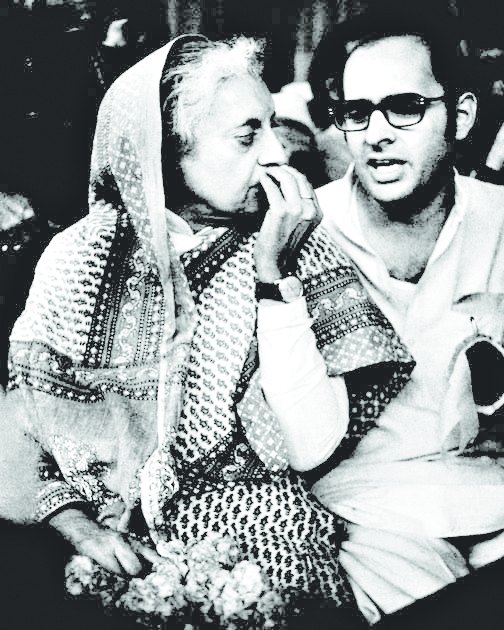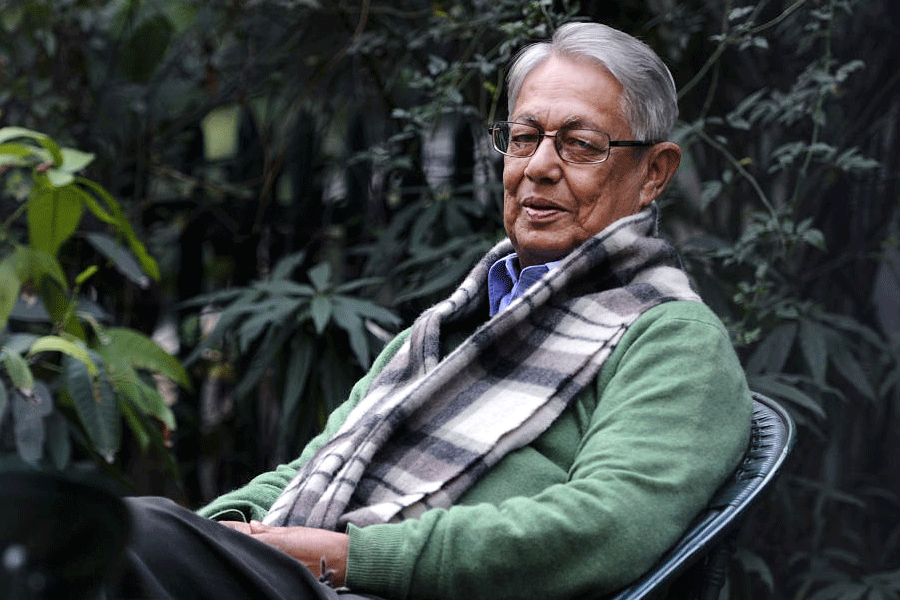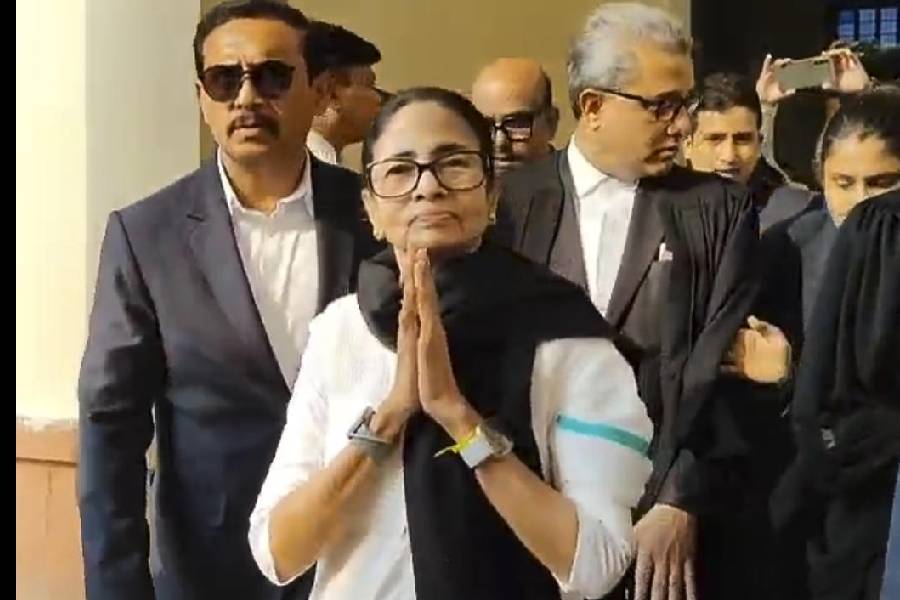
This newspaper reported on July 9, 2010 that "a close Indira (Gandhi) associate" told Nayantara Sahgal's sister during the Emergency, "We could pick her up under Misa any day." The report explains, "The four-letter acronym stood for the dreaded Maintenance of Internal Security Act, which gave the government powers of indefinite preventive detention."
Although Mrs Sahgal (Vijayalakshmi Pandit's daughter) famously demonstrated that blood was not thicker than water, she must have been relieved at not being "picked up" after her cousin's proclamation of June 25, 1975. Not so the media manager who watched lesser (as he regarded them) newspapermen achieve glory by being imprisoned while his valour was ignored. How could he take the moral high ground with Kuldip Nayar, Gour Kishore Ghosh, Barun Sengupta, Jyotirmoy Datta and other non-entities inside? He thought of shaving his head in penance but Ghosh beat him to it. He contemplated jumping from a three-storey house but Datta had already advertised having done so, whether or not he had actually leapt. Virendra Kapoor had sampled two jails, Tihar and Bareilly, while he didn't even know one. How could he demand a high position as reward from Jayaprakash Narayan when it was all over?
Like the newly-engaged office girl, whose ring no one noticed until she exclaimed that she would have to take it off if it grew any hotter, he invented a set piece for leaving parties early. "I must dash back to throw a toothbrush and some pyjamas into a suitcase," he would announce breathlessly when festivities were peaking. The silence that followed was broken by his ominous utterance. "I am told they are coming for me tonight!"
They never did. Some claimed that the chief minister had said he was damned if he would oblige anyone's craving for martyrdom. Others more cruelly suggested that the chief minister was blissfully unaware of his existence. A third version had it the CM had referred the matter to Delhi and was told, "Not worth it." He took to saying the warrant and his cell were both ready but Indu had stepped in. (By then his world was peopled by characters such as Indu and Bobo, Manu, Jeh, Jake, Tinu and Bulbul - he went to desperate lengths to find out nicknames that were never used in the hearing of these worthies). Vidya Charan Shukla, Mohammed Yunus and the CM wanted him behind bars. So, if truth were told, did Indu. But she needed him more. "If only my government had the benefit of your brain-box!" she had said. Did she actually? To his face? Well not quite, he hummed and hawed. She told Bobo - P.N. Haksar - who told India's ambassador to France who told his cousin in Calcutta.
His boasting anxiety recalled encounters during the raid raj of the 1960s. "Haven't you been raided?" people asked eagerly. Denial widened the gap separating the lesser folk. Affirmation invited competitive comparison. "They came with a metal detector and went over all the walls!" people breathed in quivering excitement. You counted for nothing if you escaped this flattering attention. But there was a difference. Those raids were directed at traders and tycoons whose ill-gotten wealth was hidden in cavities behind walls and under floors. Foreign accounts hadn't been invented then. But, naturally, politics and settling old scores were laced into questions of filthy lucre.
Everyone connected with the Emergency spoke only in terms of selfless service. "I have done no wrong," Mrs Gandhi declared, "for I have done nothing for myself." JP wanted civil, police and military officials "not to hesitate to revolt" if asked to go against the popular will and national interest. Morarji Desai knew the popular will and national interest demanded that he become prime minister. Charan Singh only wanted a chance to prove Asoke Krishna Dutt, veteran Congressman and barrister, right in saying that he could be even more dictatorial than Mrs Gandhi. Everyone, including the man who waited every night for the police who never came, yearned only to save the country.
Hegel summed it up. "The East knew and to the present day knows only that One is Free; the Greek and Roman world, that some are free; the German World knows that All are free. The first political form therefore which we observe in History, is Despotism, the second Democracy and Aristocracy, the third Monarchy." Whether or not Hegel was right about Greeks, Romans and Germans, he wasn't too far out where the East (India especially) is concerned. Even under Jawaharlal Nehru - and India will never have a more Westernized leader - India was as much of the East in this respect as it is under Narendra Modi. The traditional zamindar, British India's "officer", today's minister, or the Lalit Modis of a classless borderless tomorrow where identities and passports are up for sale confirm that only the One matters in our system.
The Emergency highlighted this importance to the exclusion of other people. It encouraged hypocrisy and dishonesty at every level. The media manager epitomized the debasement of the human spirit that was its most pernicious legacy. Mrs Gandhi invented "the threat to internal stability" to save her job from the consequences of the Allahabad High Court judgment. Her adversaries were no better. Some compared the Shah Commission to the Nuremberg trials and Watergate inquiry. As I reported then, it reminded me of "Arthur Miller's savage parody of America's McCarthy era in The Crucible." Siddhartha Shankar Ray blamed Sanjay Gandhi. R.K. Dhawan gave all the orders but blames Ray.
Despite the posturing, the suffering was undeniable during those months when trains ran on time and the Life Insurance Corporation of India offices didn't have enough tables and chairs for all its employees attending work for the first time. According to one estimate, 110,000 people were flung into jail, many undoubtedly as a result of local feuds and power struggles. The victims were not just glamorous celebrities like the rajmatas of Jaipur and Gwalior. Nor only political luminaries like JP and Desai. Relatively unknown people were also imprisoned, among them Dipankar Chakrabarti, editor of a Bengali journal, Aneek, and his colleague, Sukanta Raha. They were arrested under the Defence of India Rules. An additional sessions judge refused bail on the ground that their editorial, "India's annexation of Sikkim", was "calculated to prejudice the minds of the people against the territorial integrity of the Union of India."
As it happens, the 40th anniversary of Sikkim's annexation precedes the 40th anniversary of the Emergency declaration by just over five weeks.
We mustn't forget at least two other anniversaries. If Napoleon hadn't been defeated at Waterloo on June 18, 1815, European unity might have been achieved two centuries earlier, although the circumstances would have made the British even more uneasy. Finally, it's 800 years since England's King John accepted Magna Carta, which has become all things to all men around the world but which the author of 1066 and All That mischievously commented was "a Good Thing for everyone (except the Common People)." No doubt many other anniversaries are just as significant in other parts of the world.
It's an ill wind that blows no one any good. The Emergency was no different. Daniel Patrick Moynihan, who had then retired as American ambassador in New Delhi, had just become a member of the United States of America Senate when Mrs Gandhi struck. When Gerald Ford asked his opinion of the suspension of civil rights and cancellation of elections, Moynihan replied, "Mr President, look at it this way. Under your administration, the United States has become the world's largest democracy."
The media manager took to telling everyone that he rejected Indu's lavish offers and overtures during the Emergency. Instead, he took great pains to evade arrest only to coordinate global support for her victims.










